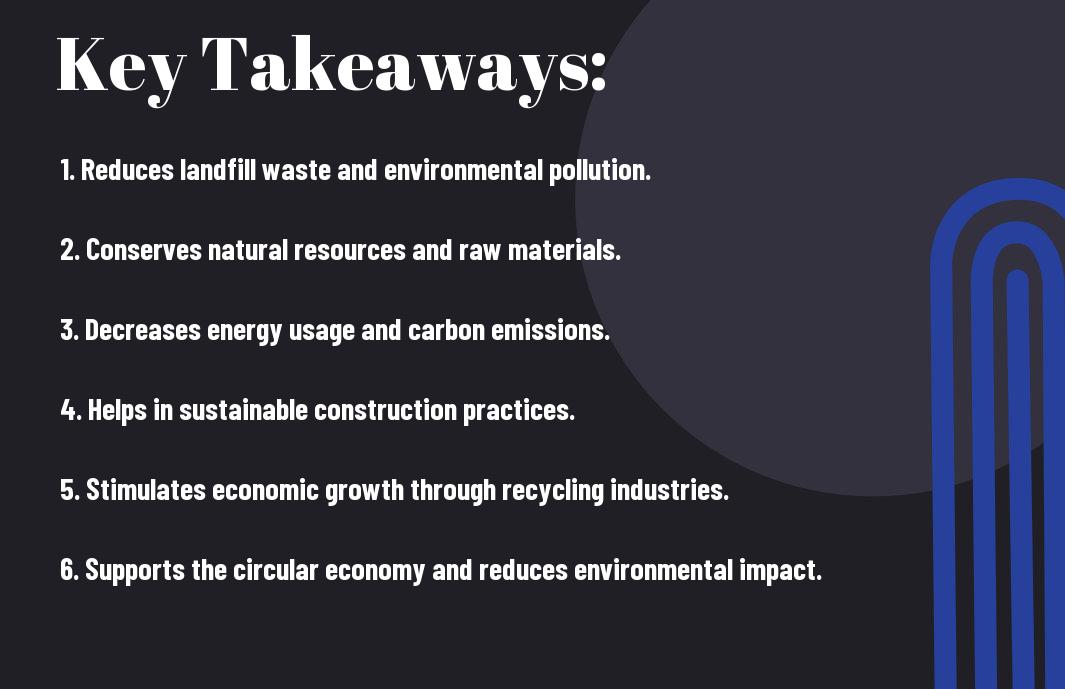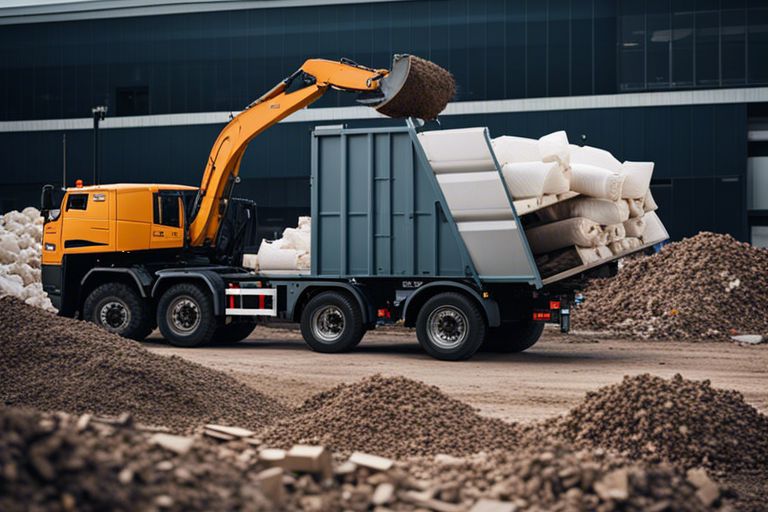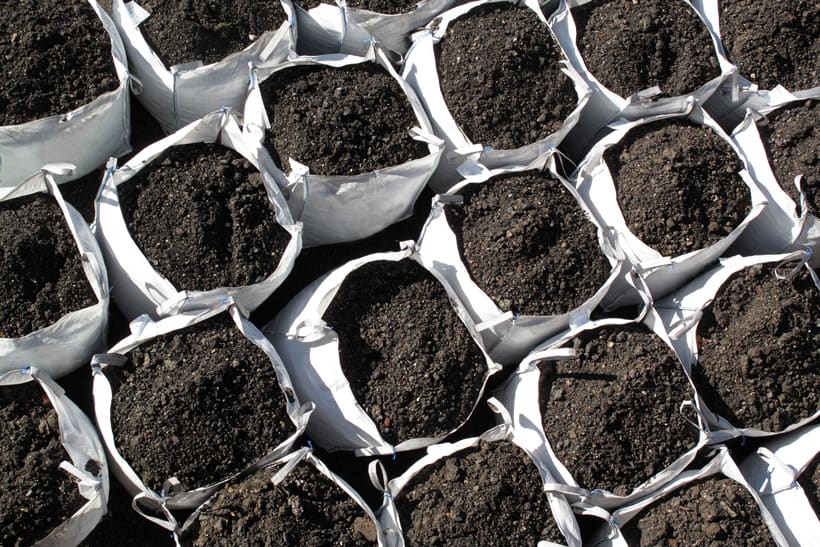Recycling is a crucial aspect of sustainable living, and this principle extends to the construction industry as well. Construction materials account for a significant amount of waste generated, and the impact on the environment can be quite severe. In this blog post, we will explore the importance of recycling construction materials and how it can contribute to a healthier environment. By diverting materials from landfills, we can significantly reduce the amount of waste that ends up polluting our land, water, and air. Additionally, recycling construction materials helps conserve natural resources and reduces the need for new material extraction, which often involves harmful processes. As we delve into this topic, it becomes evident that recycling construction materials is not only important but also essential for the well-being of our planet.
Key Takeaways:
- Reduces environmental impact: Recycling construction materials helps in reducing the environmental impact by conserving natural resources, reducing the need for landfill space, and minimising energy consumption in the production of new materials.
- Decreases carbon emissions: Recycling construction materials reduces carbon emissions as it requires less energy compared to producing new materials, leading to a lower carbon footprint for construction projects.
- Promotes sustainability: Recycling construction materials promotes sustainability by extending the lifespan of materials, reducing the demand for raw resources, and supporting the circular economy model.

The Benefits of Recycling Construction Materials
Recycling construction materials is crucial for the sustainability of our environment. By reusing materials from demolished buildings or construction sites, we can significantly reduce the demand for natural resources and the amount of waste sent to landfills.
Conservation of Natural Resources
One of the primary benefits of recycling construction materials is the conservation of natural resources. By reusing materials such as concrete, wood, and metal, we can preserve finite resources such as timber, water, and minerals. This not only reduces the need for new extraction, but also helps in minimising the environmental impact of mining and logging activities.
Reducing Landfills and Pollution
Recycling construction materials also plays a critical role in minimising the amount of waste sent to landfills and reducing pollution. Construction waste accounts for a significant portion of the overall waste stream, and by diverting these materials from landfills, we can alleviate the strain on these disposal sites and prevent harmful pollutants from leaching into the soil and water.
By recycling materials such as concrete and asphalt, we can also diminish the need for new production, which in turn decreases carbon emissions and contributes to cleaner air and a healthier environment.

Strategies for Recycling Construction Materials
When it comes to recycling construction materials, there are several strategies that can be implemented to minimise waste and environmental impact. One of the key strategies is to have a robust waste management plan in place, which ensures that materials are reused or recycled wherever possible. Additionally, innovative recycling technologies are being developed to further improve the efficiency and effectiveness of construction material recycling.
Waste Management Plans
A well-developed waste management plan is crucial for ensuring that construction materials are recycled effectively. This involves carefully managing the waste generated on construction sites, and implementing processes to separate and recycle materials such as concrete, wood, and metal. By incorporating recycling into waste management plans, construction companies can significantly reduce the amount of waste sent to landfill sites.
Innovative Recycling Technologies
Advancements in recycling technologies are playing a crucial role in improving the recycling of construction materials. Technologies such as mobile concrete crushers and on-site recycling units are allowing construction companies to recycle materials directly at the job site. This not only reduces the need for transportation, but also minimises the environmental impact associated with material disposal.
These innovative recycling technologies are revolutionising the construction industry, making it easier and more cost-effective to recycle materials such as asphalt, concrete, and bricks. By utilising these advanced technologies, construction companies can reduce their reliance on virgin materials and contribute to a more sustainable future for the industry.
Case Studies of Successful Recycling Initiatives
Recycling of construction materials has proved to be a crucial aspect of sustainable development, with numerous successful initiatives showcasing the positive impact of recycling on the environment. The following case studies shed light on how recycling construction materials has reduced waste, conserved resources, and lowered carbon emissions.
- Case Study 1: A construction company in London recycled 95% of the demolition waste from a major project, diverting over 10,000 tonnes of material from landfill.
- Case Study 2: A housing development in Manchester used recycled aggregates for 80% of their construction, resulting in a 30% reduction in carbon emissions compared to traditional methods.
- Case Study 3: A road construction project in Birmingham saved over 50,000 tonnes of natural resources by incorporating recycled materials, contributing to a significant reduction in environmental impact.
Government-Led Programs
Government-led programs have played a pivotal role in promoting the recycling of construction materials. Through initiatives such as tax incentives for recycling, strict waste management regulations, and public procurement policies favouring recycled materials, governments have encouraged the construction industry to embrace sustainable practices. As a result, many construction companies have adopted recycling measures to comply with regulations and take advantage of the benefits offered by these programmes.
Private Sector Success Stories
The private sector has also demonstrated its commitment to sustainable construction practices through successful recycling initiatives. Several companies have implemented advanced technologies to recycle construction materials, invest in research and development of new recycling processes, and collaborate with suppliers to source recycled materials. This proactive approach not only benefits the environment but also enhances the companies’ reputation and contributes to their corporate social responsibility agenda.
Private sector success stories highlight how innovative thinking, strategic partnerships, and a commitment to sustainability can drive positive change in the construction industry. By incorporating recycled materials into their projects, companies can significantly reduce their environmental footprint and contribute to the preservation of natural resources.
Obstacles and How to Overcome Them
When it comes to recycling construction materials, there are certain obstacles that need to be addressed in order to maximise the environmental benefits. It’s important to understand and overcome these hurdles to make the most of this sustainable practice. For more information on the positive impact of using recycled building materials, check out The Benefits of Recycled Building Materials.
Economic Challenges
One of the main obstacles in recycling construction materials is the economic challenge. The cost of recycling materials can sometimes be higher than using virgin materials, especially if there are no local recycling facilities available. To overcome this, it’s important for the construction industry to invest in efficient recycling processes and technologies. Additionally, government incentives and subsidies can help make it more economically viable for businesses to recycle construction materials.
Regulatory and Logistical Constraints
Regulatory and logistical constraints also pose significant challenges in the recycling of construction materials. Complex regulations and lack of standardisation can create barriers for businesses looking to recycle. Moreover, the logistical aspect of transporting and storing recycled materials can be challenging, especially for large-scale construction projects. It’s crucial for the industry to work with regulatory bodies to streamline the recycling process and address these constraints.
Moreover, the lack of awareness and knowledge about the benefits of using recycled building materials can also hinder the industry’s progress in overcoming these obstacles. Educating stakeholders and decision-makers about the positive environmental impact and long-term cost savings of recycled materials is essential in addressing regulatory and logistical constraints.

The Importance of Recycling Construction Materials for the Environment
In conclusion, recycling construction materials is of utmost importance for the environment. By reusing and repurposing materials such as concrete, wood, and metal, we can significantly reduce the amount of waste that ends up in landfills. This not only conserves natural resources but also reduces the energy and emissions associated with mining and manufacturing new materials. Additionally, recycling construction materials helps to lower the environmental impact of the construction industry, which is a significant contributor to pollution and resource depletion. With the increasing demand for sustainable and environmentally-friendly practices, recycling construction materials plays a crucial role in promoting a more circular economy and reducing the overall environmental footprint of the construction sector. It is essential for construction companies, contractors, and policymakers to prioritise and invest in recycling efforts to effectively mitigate the environmental impact of construction activities.
FAQ
Q: Why is recycling construction materials important for the environment?
A: Recycling construction materials is important for the environment because it reduces the demand for new resources, saves energy, and minimises the amount of waste sent to landfills, thereby reducing pollution and conserving natural habitats.
Q: What types of construction materials can be recycled?
A: Many types of construction materials can be recycled, including concrete, wood, metal, asphalt, plastics, and glass. These materials can be repurposed for use in new construction projects or for other purposes.
Q: How does recycling construction materials help in conserving natural resources?
A: Recycling construction materials helps in conserving natural resources by reducing the need for extracting and processing raw materials. This helps in preserving natural habitats, reducing energy consumption, and lowering greenhouse gas emissions.
Q: What are the benefits of recycling construction materials for the construction industry?
A: Recycling construction materials can lead to cost savings for the construction industry, as it reduces the need to purchase new materials. It also helps in meeting sustainability goals, improving the industry’s public image, and complying with environmental regulations.
Q: How can individuals and businesses contribute to recycling construction materials?
A: Individuals and businesses can contribute to recycling construction materials by segregating and disposing of construction waste properly, supporting and using recycled products, and advocating for sustainable construction practices. Additionally, they can explore and invest in recycling facilities and technologies.







